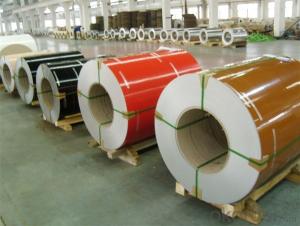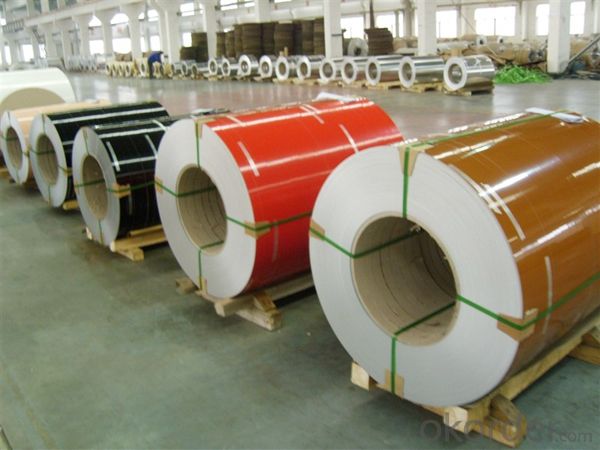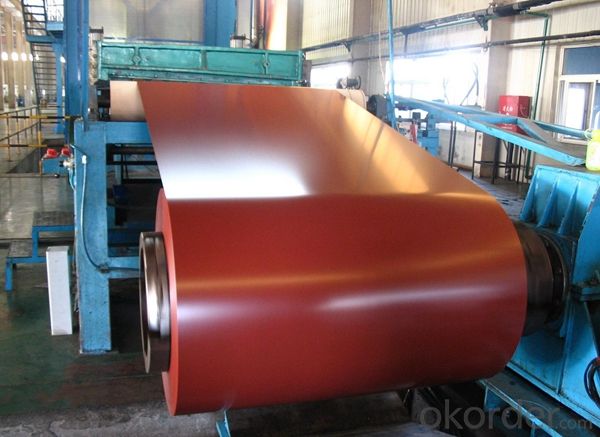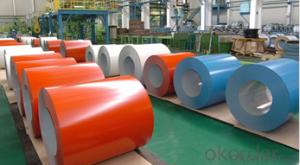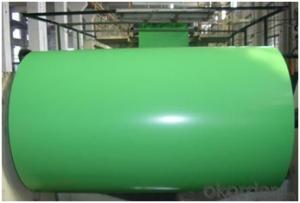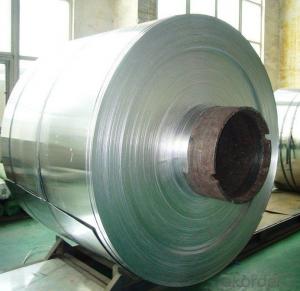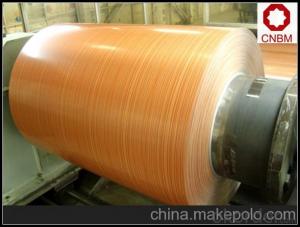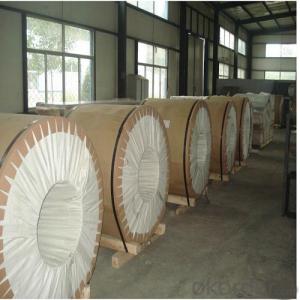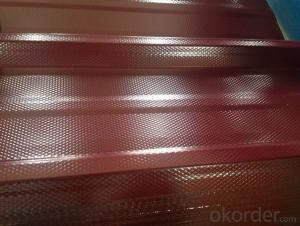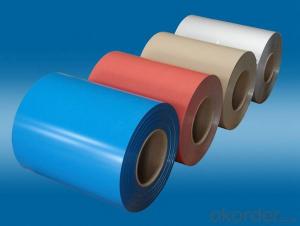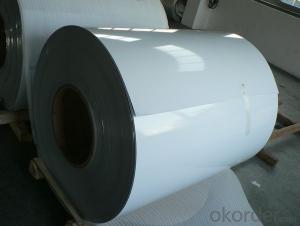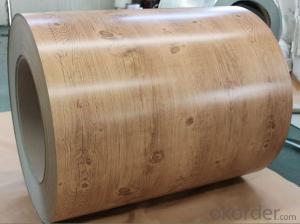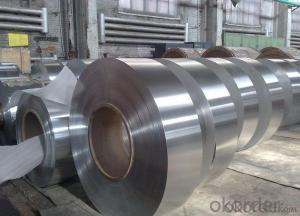Coil Coated Aluminum Plate for Metal Wall System
- Loading Port:
- Shanghai
- Payment Terms:
- TT OR LC
- Min Order Qty:
- 5 m.t.
- Supply Capability:
- 10000 m.t./month
OKorder Service Pledge
OKorder Financial Service
You Might Also Like
Specification
1. Specification of Color Coated Aluminum Coil for Metal Wall System
characteristics | Application |
1) Super peeling strength | 1) Building exterior curtain walls |
2) Excellent surface flatness and smoothness | 2) Decoration and renovation additions for old buildings |
3) Superior weather, corrosion, pollutant resistance | 3) Decoration of interior walls, ceilings, bathrooms, kitchens and balconies |
4) Even coating, various colors | 4) Shop door decorations |
5) Fireproof, excellent heat and sound insulation | 5) Advertisement board display platforms and signboards |
6) Superior impact resistance | 6) Wallboards and ceilings for tunnels |
7) Lightweight and easy to process | 7) Industrial materials, materials for vehicles and boats |
2. Application of Color Coated Aluminum Coil for Metal Wall System
(1).Interior: wall cladding, ceilings, bathrooms, kitchens and balconies, shutters, doors...
(2).Exterior: wall cladding, facades, roofing, canopies, tunnels,column covers , renovations...
(3).Advertisement: display platforms, signboards, fascia, shop fronts...
3. Feature of Color Coated Aluminum Coil for Metal Wall System
*Such coil is specially designed to replace aluminum ingot, due to the high export tax of aluminum ingot, the coil has better price than ingot.
*This type of coil can fit customer's remelting furnace just like ingot, no need to make any change to the production line that was previously used for ingot. The standard coil size and weight is very suitable for the feed gate of furnace.
*This type of coil causes less material wastage than ingot when remelted.
*Our coil is made directly from ore, no need to go though the ingot making process, quality is much better than other suppliers who use ingot scrap to make coil.
Be free from Oil Stain, Dent, Inclusion, Scratches, Stain, Oxide Dicoloration, Breaks, Corrosion, Roll Marks, Dirt Streaks and other defect which will interfere with use
4. Certificate:
SGS and ROHS(if client request, paid by client), MTC(plant provided), Certificate of Origin(FORM A, FORM E, CO), Bureau Veritas and SGS (if client request, paid by client), CIQS certificate
5. Image of Color Coated Aluminum Coil for Metal Wall System
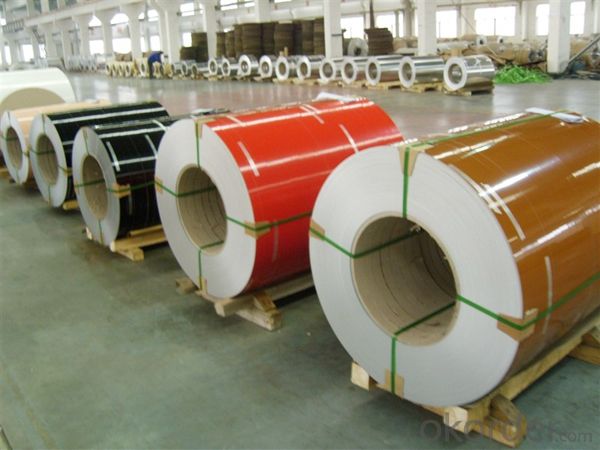
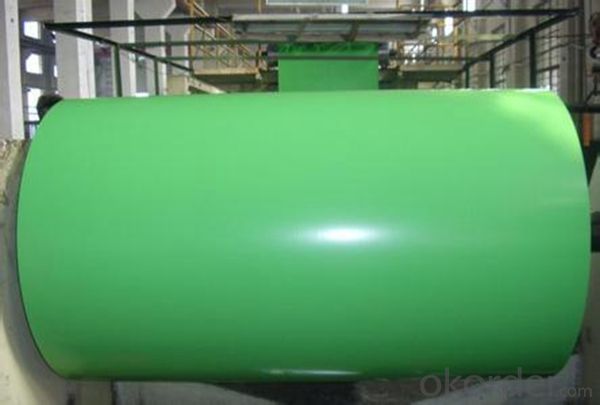
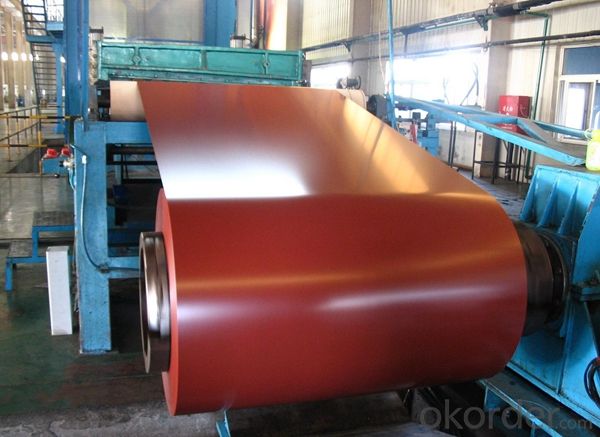
6. Package and shipping of Color Coated Aluminum Coil for Metal Wall System
eye to wall
eye to the wall
with wood pallet (wooded case also available)
7. FAQ
1) What is the delivery time?
Dpends on actual order, around 20 to 35 days
2)What is the QC system:
We have QC staff of 20 persons and advanced equipment, each production is with MTC traced from Aluminum ingot lot.
3) What market do you mainly sell to?
Australia, America, Asia, Middle East, Western Europe, Africa etc
- Q: Aluminum metal reacts with hydrochloric acid, HCl, to form hydrogen gas (H2) and a solution of aluminum chloride. Write and balance the equation. Can someone help I just dont get this Al2 + 6HCl → 3H2 + 2AlCl3 Al2 + 2HCl → H2 + 2AlCl 2Al + 6HCl → 3H2 + 2AlCl3 Al + 2HCl → H2 + AlCl2 6Al + 2HCl → H2 + 2Al3Cl
- Aluminum reacts with HCl ... This is a single replacement reaction in which aluminum replaces hydrogen ion. Aluminum metal is oxidized by H+, and H+ is reduced by aluminum metal. Chloride ion is a spectator ion. You also need to know that aluminum usually exhibits a +3 oxidation state. This means that there will be three chloride ions (oxidation number of -1) for each aluminum. 2Al(s) + 6HCl(aq) -- 2AlCl3(aq) + 3H2(g)
- Q: What are the different coil transportation options for aluminum coils?
- There are several different coil transportation options available for aluminum coils. 1. Flatbed Trucks: Flatbed trucks are commonly used for transporting aluminum coils. These trucks have an open top and are equipped with a flat, open trailer bed. The coils are securely strapped or banded onto the bed to prevent any movement during transportation. 2. Coil Racks: Coil racks are specialized transportation equipment designed specifically for carrying aluminum coils. These racks are usually made of steel and are placed inside a truck or trailer. The coils are stacked on the racks, which have dividers to keep them in place and prevent any shifting or damage. 3. Coil Trailers: Coil trailers are trailers that are specifically designed for transporting aluminum coils. These trailers have a unique coil cradle system that securely holds the coils in place during transportation. The cradles are adjustable to accommodate different coil sizes and prevent any movement or damage. 4. Container Shipping: Aluminum coils can also be transported using shipping containers. The coils are loaded into the containers and secured using straps or bracing. This option is commonly used for international transportation, as containers can be easily loaded onto ships or trains. 5. Rail Transport: Rail transport is another option for transporting aluminum coils. Specialized rail cars, known as coil cars, are used for this purpose. These cars have cradles or racks built into them to securely hold the coils during transit. Rail transport is often used for long-distance transportation, as it is a cost-effective and efficient method. Overall, the choice of coil transportation option depends on factors such as distance, cost, and the specific requirements of the coils being transported.
- Q: This question asks for the distinctions between two forms of aluminum used in various industries: coils and sheets.
- <p>Aluminum coil and aluminum sheet are both flat aluminum products but differ in form and usage. Aluminum coil is a long, continuous roll of aluminum that can be easily cut to length and is often used for manufacturing processes like stamping, bending, and forming. It's ideal for applications requiring a consistent and uniform supply of material. On the other hand, aluminum sheet is a flat, rectangular piece of aluminum with a specific thickness, width, and length. It is used for applications where a single piece of material is needed, such as in construction, signage, and decorative purposes. The main difference lies in the form factor and the way they are used in manufacturing and construction processes.</p>
- Q: What types of aluminum coils are there that are designed for particular applications?
- <p>Yes, there are various types of aluminum coils designed for specific purposes. For instance, there are coils for construction, which are often used for roofing and siding. Coils for automotive applications are used in manufacturing car parts. Reflective coils are ideal for heat reflection in industries like food processing. Coils for electrical applications are used in transformers and wiring. Each type has specific properties like thickness, strength, and surface finish tailored to meet the requirements of their respective industries.</p>
- Q: Can aluminum coils be used for food processing equipment?
- Yes, aluminum coils can be used for food processing equipment. Aluminum is a popular material choice for its excellent heat transfer properties, corrosion resistance, and lightweight nature. It is commonly used in the construction of food processing equipment such as heat exchangers, evaporators, and condensers.
- Q: Can aluminum coils be used for automotive body panels?
- Yes, aluminum coils can indeed be used for automotive body panels. In fact, aluminum is becoming increasingly popular in the automotive industry due to its many advantages. Aluminum is lightweight, which can contribute to improved fuel efficiency and overall performance of the vehicle. Additionally, aluminum has excellent corrosion resistance properties, making it a durable choice for automotive body panels. Moreover, aluminum can be easily formed and molded, allowing for intricate designs and better aerodynamics. Overall, the use of aluminum coils for automotive body panels is a viable option that offers numerous benefits.
- Q: Is it possible to utilize aluminum coils in the construction of solar panels or wind turbines?
- <p>Aluminum coils can be used in the construction of both solar panels and wind turbines, but not as the primary material for energy conversion. In solar panels, aluminum is often used for framing and mounting structures due to its lightweight and corrosion-resistant properties. For wind turbines, aluminum is utilized in the manufacturing of certain components such as nacelle shells and towers, but the main rotor blades are typically made from composite materials for their strength and aerodynamic properties. Thus, while aluminum plays a supportive role in these renewable energy technologies, it is not the core material for capturing solar or wind energy.</p>
- Q: This question asks for a comparison of the benefits and drawbacks associated with using aluminum coil.
- <p>Aluminum coil offers several advantages such as high strength-to-weight ratio, corrosion resistance, and excellent thermal and electrical conductivity. It is also cost-effective and easy to form, making it ideal for various applications like construction, automotive, and electrical industries. However, it has some disadvantages, including lower strength compared to steel, potential for galvanic corrosion when in contact with dissimilar metals, and a higher likelihood of denting or denting. Additionally, aluminum's recycling process can be energy-intensive, which may impact its environmental sustainability.</p>
- Q: Can aluminum coils be used in automotive applications?
- Yes, aluminum coils can be used in automotive applications. Aluminum coils are lightweight, which makes them an excellent choice for automotive manufacturers as it helps to reduce the overall weight of the vehicle. This, in turn, can improve fuel efficiency and performance. Additionally, aluminum coils have excellent heat conductivity, which is crucial in automotive applications where heat dissipation is important. Moreover, aluminum coils have good corrosion resistance, which is particularly beneficial in automotive applications where vehicles are exposed to various weather conditions and road salts. Overall, the use of aluminum coils in automotive applications can provide several advantages such as weight reduction, improved fuel efficiency, better heat dissipation, and enhanced corrosion resistance.
- Q: What is the fatigue strength of aluminum coils?
- Various factors, including the specific alloy used, the manufacturing process, and the application, can cause the fatigue strength of aluminum coils to vary. In comparison to other materials, aluminum alloys generally possess good fatigue strength, making them appropriate for a broad range of applications that necessitate resistance to cyclic loading and fatigue. Due to their lightweight nature and excellent corrosion resistance, aluminum coils find common use in industries such as automotive, aerospace, and electrical. Fatigue testing is typically employed to determine their fatigue strength, involving subjecting the material to repeated cycles of stress until failure occurs. Aluminum alloys in coil form are engineered to endure cyclic loading without experiencing significant damage or failure. The fatigue strength of aluminum coils can be influenced by factors like alloy composition, heat treatment, and surface finish. Generally, higher strength aluminum alloys, such as those belonging to the 7000 series, exhibit greater fatigue strength compared to lower strength alloys like the 1000 or 3000 series. To accurately ascertain the specific fatigue strength of aluminum coils, it is vital to consider the intended application, expected stress levels during operation, and desired service life. Predictions regarding fatigue life can be made using various models and testing methods, such as S-N curves (stress amplitude vs. number of cycles to failure). In summary, aluminum coils generally possess good fatigue strength, rendering them a suitable choice for applications requiring resistance to cyclic loading and fatigue. However, the specific fatigue strength of aluminum coils can vary depending on factors such as alloy composition, heat treatment, and surface finish. To accurately determine the fatigue strength for a specific application, it is advisable to consult technical specifications or conduct fatigue testing.
Send your message to us
Coil Coated Aluminum Plate for Metal Wall System
- Loading Port:
- Shanghai
- Payment Terms:
- TT OR LC
- Min Order Qty:
- 5 m.t.
- Supply Capability:
- 10000 m.t./month
OKorder Service Pledge
OKorder Financial Service
Similar products
Hot products
Hot Searches
Related keywords
